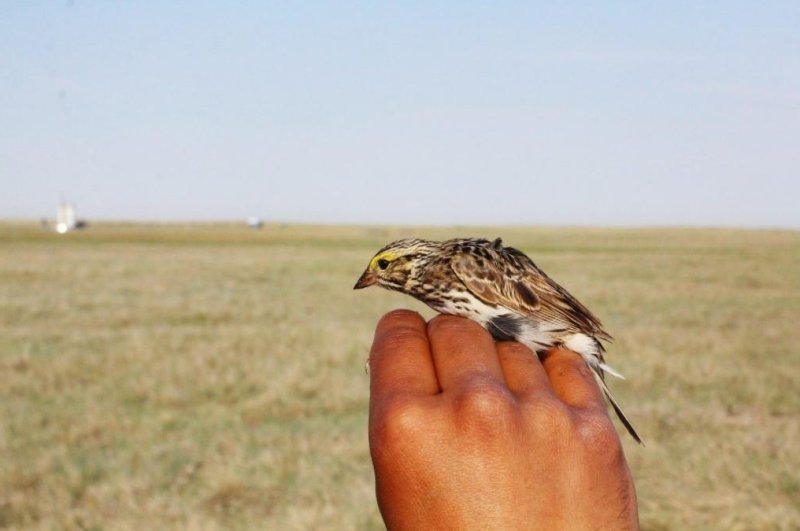When savannah sparrows are stressed, they have a harder time interpreting the songs of their peers. Photo by Clair Curry
March 5 (UPI) -- Songbirds native to Canada's prairies are still in communication with one another despite the interference of oil and gas drilling sounds, new research shows.
Previous research found prairie songbirds had augmented their songs, but scientists weren't sure whether the new tunes would have the same effects -- or carry the same message. The latest findings, detailed in the journal Scientific Reports, prove the songbirds can understand each other.
"This study shows that altering songs in noisy environments is both necessary and effective," Nicola Koper, researcher and professor at the University of Manitoba, said in a news release. "If they don't change their songs, birds that hear those songs respond the wrong way -- so changing the song is necessary to be understood over the noise. But birds that hear the altered songs consistently respond much more appropriately."
To ensure their songs stand out from the drone of oil and gas machinery, the birds altered the pitch and volume of certain song notes. For the most part, the technique works, but not everyone can comprehend the messaging.
Scientists found birds that are stressed are less likely to understand birdsongs, and the intrusion of manmade noises are one of several stressors impacting native species on Canada's prairies.
"I think of it using the scenario of being a parent with a kid tugging on your arm saying, 'MOM! MOM! MOM!' in a noisy parking lot next to a freeway," said Koper.
Under normal circumstances, a mom might immediately realize her kid is hungry. But with outside noise and stress, the mom may need a clearer message: "Mom, I'm hungry."
"If you're super stressed with everything else going on in your life, you might not get what they are saying," Koper said.
Researchers found savannah sparrows living near pumpjack oil wells had higher stress levels. They also had a more difficult time interpreting different bird calls. Birds living near quieter and less physically intrusive wells, called screwpumps, were less stressed and had an easier time understanding each other.
"We knew that adding these noisy, large structures to the landscape could stress some animals. We knew it could change the behavior of some animals," said lead study author Claire Curry, now a researcher at the University of Oklahoma's Oklahoma Biological Survey. "However, to our knowledge, this is the first study to look at the interaction between stress and behavior at these oil wells. These results show that birds can be quite sensitive to the visual and acoustic landscape around them; stress and noise may be a double whammy for sensitive species."















